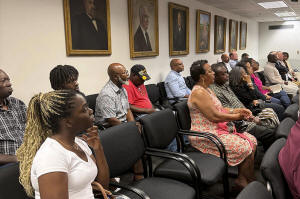Judge rules Georgia railroad can seize land as landowners vow to fight
 Send a link to a friend
Send a link to a friend
 [February 07, 2025]
By JEFF AMY [February 07, 2025]
By JEFF AMY
ATLANTA (AP) — A judge has ruled that a Georgia railroad can buy land
against the will of property owners to build a track, rebuffing a
challenge that a libertarian group hoped could make it harder to use
eminent domain to take property.
Fulton County Superior Court Judge Craig Schwall Sr. ruled Tuesday that
the Sandersville Railroad could condemn a 200-foot (60-meter) wide strip
of property running 4.5 miles (7.3 kilometers) to build a rail line
serving a rock quarry and other users. Landowners fighting the railroad
had appealed a Georgia Public Service Commission ruling allowing the
land taking.
Schwall kept a freeze on construction for now, with landowners saying
they would appeal to the Georgia Supreme Court.
The case matters because private entities need to condemn private land
for railroads and facilities including pipelines and electric
transmission lines.
The Sandersville Railroad, owned by an influential Georgia family, wants
to connect the quarry to the CSX railroad at Sparta, allowing products
to be shipped widely. Sparta is a mostly Black rural town about 85 miles
(135 kilometers) southeast of Atlanta in one of Georgia's poorest
counties.
Sandersville has agreements to buy some of the 18 parcels it needs. But
other owners say losing a strip of property would spoil land they
treasure, and that some families have owned for a century.

“Every day that Sandersville isn’t coming onto our land and starting to
build is a good day,” Diane Smith, one of the owners, said in a
statement. “But we won’t rest easy until we know for sure that they’ll
never be able to take our land from us.”
Brian Brodrick, a lawyer for the railroad, urged opposed property owners
in a Thursday statement “to return to the negotiating table so we can
bring new opportunities and channels of trade to all the citizens of
Hancock County and the region." He said the spur would have “minimal
impacts” on neighbors.
Some people in the rural neighborhood think the railroad would enable
expansion at a quarry owned by Heidelberg Materials, a publicly traded
German firm. They dislike the quarry because it generates noise, dust
and truck traffic.
[to top of second column]
|

Sparta residents attend a Georgia Public Service Commission
hearing on whether a railroad company can use eminent domain to
condemn property in their community, in Atlanta, Aug. 6, 2024. (AP
Photo/Charlotte Kramon, File)

Supporters say if the railroad is built, the quarry will move its
operation farther from houses, trains will reduce trucks on roads
and the railroad will build berms to shield residents.
Railroads have long had the power of eminent domain, but Georgia law
says such land seizures must be for “public use.” Opponents targeted
the project by saying it would only benefit the quarry. The
Sandersville Railroad says there are other users, including a
company located at the quarry that blends gravel and asphalt for
paving. Several companies have said they would truck products to
load them onto the new line, saying they want access to markets
served by CSX.
Schwall found the railroad met the public use standard, saying it
was necessary for the “functioning” of Sandersville and "also serves
a public purpose because it will provide a channel of trade in east
middle Georgia.”
The group representing opponents, the Institute for Justice, hoped
to use the case to chip away at eminent domain, the power to legally
take private land while paying fair compensation.
The libertarian-leaning legal group lost a landmark 2005 case
allowing the city of New London, Connecticut, to take land from one
private owner and transfer it to another private owner for economic
development. Schwall cited that case in his ruling.
“We remain committed to proving to the courts that a private
railroad’s desire to build a speculative new line entirely for the
benefit of a handful of private companies is not a public use under
the U.S. and Georgia constitutions and Georgia’s eminent domain
laws,” Institute for Justice attorney Bill Maurer said in statement.
All contents © copyright 2025 Associated Press. All rights reserved
 |